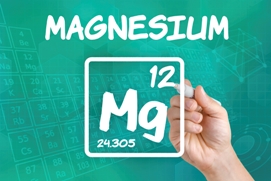How is Magnesium Good for the Body?
Magnesium is essential for many functions in the body and there may be a case for considering taking magnesium supplements for significant health benefits. For example, magnesium correlates with calcium to support proper blood pressure levels. It also helps prevent hypertension – and serves as a proper balance – to other minerals like calcium. These vital supplements even helps prevent heart attacks from occurring due to severe muscle cramping or tightness.

Magnesium also has the ability to assist with heart murmurs, arrhythmia, and restore natural functions after anxiety or panic attacks. Most of all, this vital mineral helps counter any natural magnesium deficiencies in the body. With over 80 percent of adults with nutrient deficiencies, magnesium supplements can restore proper levels across the body.
Symptoms of Magnesium Deficiencies
Magnesium deficiencies tend to cause a number of visible symptoms. These include muscle spasms, along with aches, poor digestion, anxiety, insomnia, and lack of mental clarity. The latter, of course, results in brain fogginess, confusion, and even depression. Sadly, magnesium deficiency is often overlooked and rarely tested for. In fact, the only time a physicians gets to notice this deficiency is when or she takes a blood test for another medical issue. With this in mind, it is imperative for people to take magnesium supplements – which can truly keep their minds and bodies in great shape.
Magnesium is needed by the body for overall performance and functionality. However, it is not the most present mineral in our bodies – in terms of quantities. With this in mind, it is imperative for us to take supplements to restore proper and optimal levels. Remember, magnesium is part of over 300 biochemical function and processes in the body. This includes regulating heartbeat rhythms, along with helping and enhancing neurotransmitter functions. Magnesium is also given to patients that have suffered central nervous breakdowns, along with digestive issues and/or anxiety and panic attacks.
The Importance of Magnesium Supplement for All Ages
Magnesium deficiencies can also results in the following medical problems or ailments:
- Hypertension and cardiovascular diseases.
- Liver and Kidney damage.
- Migraines, stress headaches, glaucoma, Alzheimer’s disease, and multiple sclerosis.
- Vitamin K deficiencies, along with lack of calcium, potassium, and Vitamin B1.
- Mood swings, behavioral disorders, anxiety, and depression.
- Worsened PMS symptoms.
- Insomnia and restless nights.
- Osteoporosis – lack of calcium and bone density.
- Bacterial or fungal infections – due to low levels of nitric oxide or a depressed immune system.
- Tooth decay and cavities.
- Impotence.
Magnesium deficiencies are also very common in adults. This is due to soil depletion, which lowers the amount of magnesium in crops. It is also attributed to digestive problems that lead to malabsorption of magnesium and essential minerals in the gut (flora). High rates of prescription medication and anti-biotic use also leads to lower magnesium levels in the body. Similarly, heavy use of medicines tends to damage the digestive tract – resulting in an inability to digest, process, or absorb magnesium found in essential foods.
How Else Does the Body Lose Magnesium?
The body also loses stored magnesium every day from normal functions. This includes muscle movement, heartbeat, and hormone production. While we only need small amounts of magnesium as opposed to other nutrients, we have to continuously replenish our magnesium levels. Again, this is due to already small levels of magnesium in our bodies, which must be restored via supplements or foods with high-levels of magnesium.
The kidneys primarily control levels of magnesium in our bodies. In fact, they excrete magnesium into the urine each day – and as a result – we tend to lose our levels each time we go to the bathroom. In order to keep these levels normal, supplements are the only way. With a daily or weekly supplement program, you boost vital metabolism rates. In fact, magnesium even has the ability to increase energy levels, while effectively balancing the nitric oxides (NO) in the body. As a dietary supplement, magnesium helps people lose or maintain the current weight. Magnesium is also a crucial ingredient in antacids, laxatives, and other over the counter or doctor prescribed medicines.
Different Types of Magnesium Supplements
There are many different types of magnesium supplements. Before taking any product, you should consult with your primary care physician. He or she should be able to prescribe the right supplements for you – based on blood or magnesium level tests. It is also better to take magnesium supplements that can easily dissolve in liquids, which are better for gut absorption than less soluble forms. Industry experts also recommend citrate, chelate and chloride forms for magnesium supplements. These are absorbed much better than supplements in oxide or sulfate forms.
Again, magnesium is a crucial mineral that the body needs for everyday functioning. However, most of us are born with already diminished levels – and bodily functions – tend to decrease these levels as well. With magnesium supplements, you can truly restore these levels to optimal and normal levels. You also can benefit from increased energy, strength, vitality, and so many other vital and essential health benefits.
